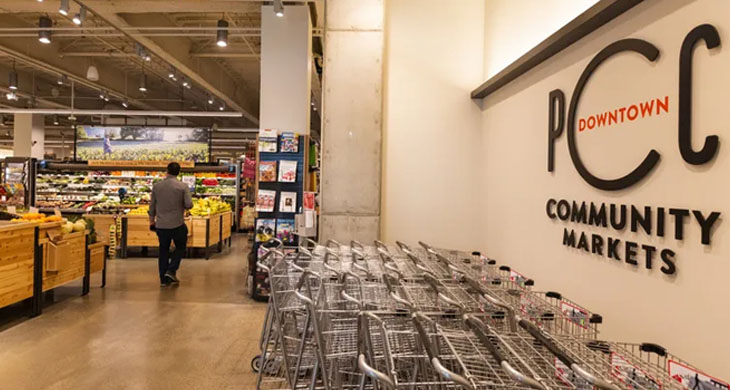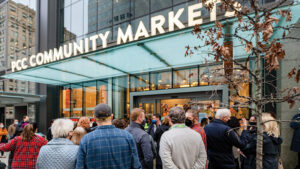Seattle grocery store PCC blames ‘lower numbers of office workers’ as it closes downtown location

Has Seattle’s office worker traffic peaked?
That’s one potential takeaway from the surprise closure of PCC Community Markets’ downtown grocery store and reports of a stalling return-to-office trend.
The store, in the heart of downtown Seattle at 1320 4th Ave., opened just last year following pandemic-related delays. It will close Jan. 31.

PCC CEO Krish Srinivasan, a former Remitly and Amazon exec, said in a statement Wednesday that the flagship store is unprofitable and “we do not see that changing for the foreseeable future.”
In a press release, PCC said the store has “significantly underperformed” relative to original forecasts “in large part due to persistently lower numbers of office workers and residential grocery shoppers in the city center following the pandemic.”
As Bloomberg reporter Matt Day pointed out, one potential reason for the store closure is Amazon.
The Seattle-based tech giant planned to occupy 30 floors in the new Rainier Square building, where PCC’s store is located.
PCC announced plans for the downtown store in 2018. But a year later, Amazon backed out of its plan, putting the high-profile 58-story building on the sublease market. Rainier Square was at the center of a heated tax battle between Amazon and Seattle in 2018.
PCC was likely banking on the fact that hundreds of hungry Amazonians would be shuffling in and out of the building each day.
Downtown recovery and hybrid work
Average daily worker foot traffic in downtown Seattle has increased year-over-year but appears to be stabilizing, according to the Downtown Seattle Association.
Seattle lags behind most other large U.S. cities in regard to its downtown recovery, and worker foot traffic is only 57% of pre-pandemic levels, according to the University of Toronto. Only Minneapolis, Louisville, and St. Louis have lower recovery metrics.
Srinivasan said the store closure “reflects the hard reality of operating a retail business in a city center transformed by the pandemic.”
PCC, which operates 15 other stores in the Seattle region, also said it is navigating “a rapid increase in cost of goods, inflation-driven impacts on the cost of living, and challenges with staff retention and public safety.”
But clearly return-to-office trends impacted the company’s bottom line at the downtown store, which employed nearly 80 people.
The commercial real estate market in the Seattle region continues to see record high vacancies, according to a report from JLL. And companies that still have office space downtown, including many tech firms, appear to be settling into hybrid work policies.
A recent survey by the Seattle Metropolitan Chamber of Commerce found that a hybrid work model is the most popular option among employers in downtown Seattle, with Tuesday, Wednesday and Thursday as the most popular days in office.
PCC employees at the downtown store cited busy lunch hours Tuesday through Thursday but “almost nothing on the weekends,” according to a report from The Seattle Times.
Amazon has earned praise from city leaders for its return-to-office mandate that went into effect earlier this year, requiring employees in the office at least three days per week.
The policy was welcome news for the restaurants, bars, doggy daycares, and other small businesses around Amazon’s headquarters, about a mile down the road from PCC’s store.
But it may not be enough to get Seattle back to pre-pandemic levels of office worker traffic, as evidenced by PCC’s decision this week.
Downtown Seattle Association CEO Jon Scholes struck an optimistic tone in a statement about the store’s closure.
“Today’s announcement could be viewed as turbulence in downtown’s post-pandemic revitalization, but downtown’s overall flight path and progress remains positive with increasing foot traffic, a record residential population and more store openings than closings,” he said.
Since opening in January of 2022, Downtown PCC has significantly underperformed relative to its original financial expectations, in large part due to persistently lower numbers of office workers and residential grocery shoppers in the city center following the pandemic. Based on these dramatically changed shopper demographics and habits, PCC sees no viable path to operating a profitable full-service grocery store at this location.
“To our staff members at the Downtown store, I want to express my deep sadness at having to make this difficult but necessary decision. It is certainly not due to any lack of effort on your part. Instead, it reflects the hard reality of operating a retail business in a city center transformed by the pandemic,” said Srinivasan. PCC employs nearly 80 staff at the Downtown store and will prioritize their placement in other roles within the co-op by offering staff positions at other stores.
The Downtown PCC lease was signed in 2018, and the original opening date in 2021 was postponed to 2022 because of general conditions in the area following the onset of the pandemic. Like most retailers since 2020, PCC has been navigating a complex business landscape that has seen a rapid increase in cost of goods, inflation-driven impacts on the cost of living, and challenges with staff retention and public safety.
The co-op posted lackluster results in 2021, and an operating loss in 2022; despite strong progress in many areas, 2023 will be similar – even with the closure of Downtown PCC. In looking ahead to 2024, the co-op is focused on restoring and securing its long-term financial viability. The closure of the Downtown store is an important and necessary step in that journey.
PCC Community Markets is grateful to the Downtown staff and store leadership for delivering an amazing shopping experience since the grand opening, and for their unwavering commitment to the store. The co-op also appreciates its loyal customers, including 115,000 members, for their continuing patronage and support of vibrant, local, organic and community food systems across PCC’s 15 other stores in the region, including seven in the City of Seattle.
PCC thanks its partners at the City of Seattle, its landlord Wright Runstad, the Seattle Chamber of Commerce and the Downtown Seattle Association for their tremendous support and collaboration. The collective steadfastness that these partners showed in support of PCC has been humbling.
Energized by the work ahead, and knowing that actions speak louder than words, the co-op’s mission is what both stewards and sustains PCC for the long haul. By staying true to its purpose and listening to staff and members, PCC expects to continue serving our region for many years to come.




